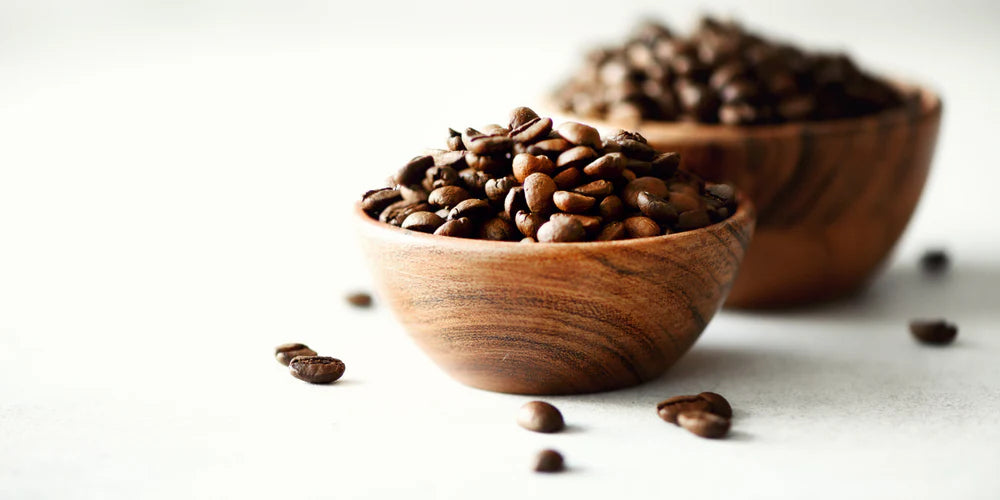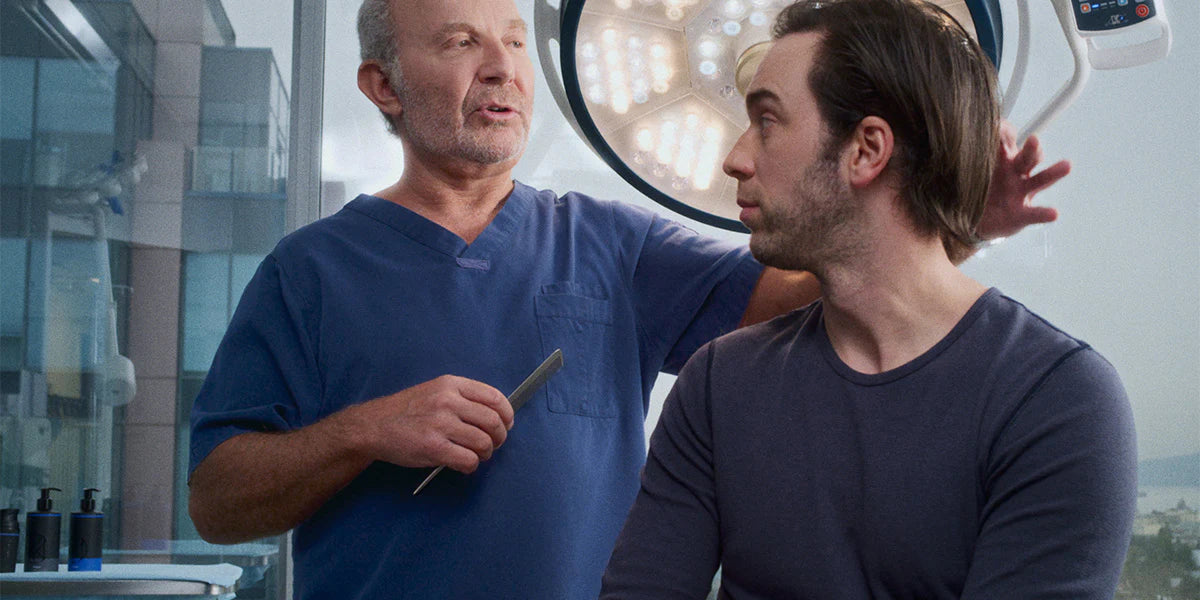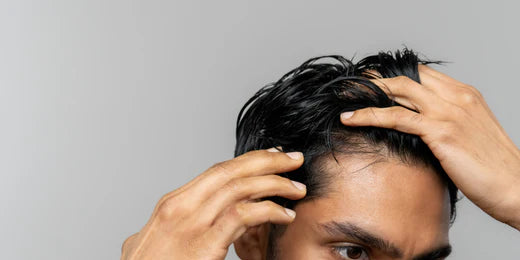Most of us know caffeine as the best way to get going in the morning, but there are other potentially useful properties which make it more than just an energy booster. Caffeine is believed to have a positive impact on your hair, with some evidence pointing to its role in promoting hair growth. So, is it worth adding caffeine into your hair care routine?
We’re going to explore this question and what makes caffeine a potentially beneficial ingredient for your hair, including some insight from Dr. Christina Han, a board-certified dermatologist and XYON’s medical director.
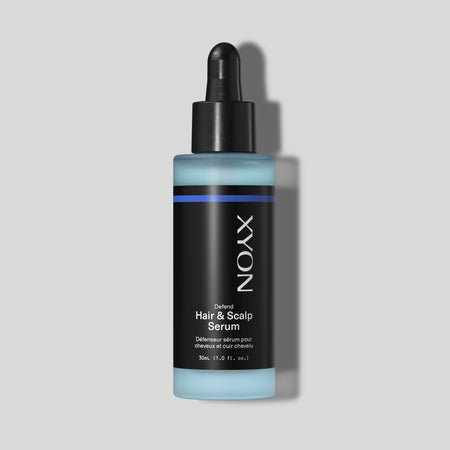
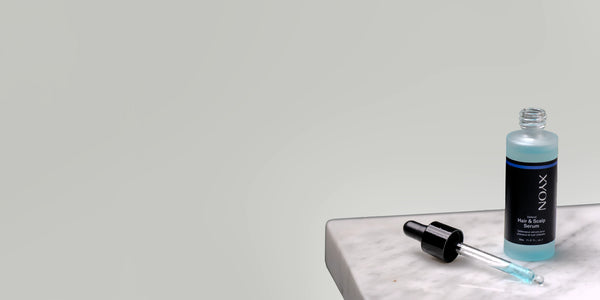
Our Men's Hair Growth Serum Contains Caffeine
In addition to many other carefully selected ingredients, our men's hair serum contains caffeine to assist with your fight against hair loss.
What is caffeine?
We’ll get into how caffeine can impact your hair, but first let’s understand what it is and how it affects your body.
Caffeine is a natural stimulant found in dozens of plants and leaves that are produced as natural pesticides for the plants and it’s also the compound responsible for giving you energy after drinking a cup of coffee. So how exactly does it do this?
When you drink a cup of coffee, the caffeine is quickly absorbed into your bloodstream, usually within 30 minutes. Once in your bloodstream, the effects of the caffeine will begin to hit and for most people, this feels like an increase in energy. This happens because caffeine is an adenosine antagonist, which means it blocks the effects of the chemical primarily responsible for making you feel tired (Holtzman et al, 1999). In addition to blocking adenosine, caffeine also increases circulating epinephrine and norepinephrine (Soeren et al, 1995), the two chemicals primarily involved in the flight or fight response. This gives you the boost of energy you feel after drinking a caffeinated drink.
Does caffeine help hair grow?
The benefits of caffeine aren’t limited to keeping you awake throughout a long day – there is some research that suggests that it might also help your hair grow. Let’s take a look at the research to support this theory.
Caffeine may block the negative effects of testosterone on hair follicles and because of this, it could be a potentially useful substance for those struggling with pattern hair loss. One study was conducted using hair follicles that had been extracted from males with androgenetic alopecia (Fischer et al, 2014). Some hair follicles were exposed only to testosterone and others were exposed to both testosterone and caffeine. Interestingly, it was discovered that the caffeine counteracted the suppression of growth caused by testosterone and the hair follicles that were exposed to both, experienced much higher levels of growth.
Caffeine is also believed to have a positive impact on the hair follicles themselves. Based off the available data, caffeine appears to prolong the active growth phase of the hair growth cycle and stimulate the production of cells around the follicles (Fischer et al, 2007). In this way, it seems to be similar to minoxidil. When directly compared to minoxidil, it was found that topical caffeine application was non-inferior to minoxidil for treating androgenetic alopecia in men (Dhurat et al, 2018). Whilst this seems encouraging, it’s important to note that to the data supporting caffeine’s use as a treatment for pattern balding is limited and that speaking to a hair loss specialist about the pharmaceutical options available is still the best course of action when it comes to establishing the best treatment plan for you.
Is caffeine a DHT blocker?
Before we answer this question, let's have a refresher on DHT blockers:
- Dihydrotestosterone (DHT) is the hormone produced from testosterone by an enzyme called 5-alpha reductase
- Together with the influence of genetics, DHT is one of the one of the primary causes of male pattern balding
- DHT blockers include natural or pharmaceutical compounds which block the action of 5-alpha reductase, preventing testosterone from being converted into DHT
- They aim to lower DHT levels, thus slowing the miniaturization (shrinking) of hair follicles
So, is caffeine a DHT blocker?
It’s uncertain. The research surrounding caffeine for hair loss is sparse, but the primary theory is that it can help to widen blood vessels at the scalp, thus improving the blood supply to key structures. Having said that, one study has suggested that caffeine inhibits 5-alpha reductase activity directly, which would give it DHT blocking properties (Herman & Herman, 2013). The same study proposes that caffeine has strong antioxidant properties and protects against damage from UV rays, so there may be multiple mechanisms behind caffeine's role in hair health.
The role of caffeine in DHT may not be clear, but there are other natural substances with more direct DHT-blocking properties that may be beneficial to add into your hair care routine. For instance, saw palmetto, a palm-like plant, is an established natural DHT blocker and you can find many hair products containing saw palmetto extract.
If you’re looking to incorporate saw palmetto and other natural ingredients into your routine to help with hair growth, our Defend Hair and Scalp Serum for men is a great option. Its biphasic formula is designed to optimize the delivery of natural ingredients to your hair and scalp, where they are most useful. We’ve also included caffeine in our serum to boost blood circulation to the scalp, as well as Capixyl™ peptide complex which helps to anchor hairs to the scalp and optimize hair thickness.
We asked Dr. Han whether she would recommend adding caffeine to your hair care routine and she explained that it can be a great adjunctive therapy for those suffering from hair loss:
“Caffeine has been shown to block DHT to the scalp and can also push hairs into the growth phase for those suffering from thinning. It’s a great supportive ingredient to add to your routine, alongside your doctor-prescribed hair loss medication.”
Can caffeine be absorbed through the scalp?
The hair follicles on the scalp are actually very efficient at absorbing caffeine. In fact, research has shown that caffeine is absorbed through the hair follicles at a much faster rate than through the outer layer of the skin, with caffeine being detected in the bloodstream as little as 5 minutes after topical application (Otberg et al, 2007). This demonstrates that even when applied to your scalp via shampoo (which is rinsed out soon after application), caffeine can still reach the areas of the scalp where it might have beneficial effects.
You’ll find many hair care products on the market which contain caffeine in their ingredients, including shampoos, conditioners and hair serums and these tend to be aimed at boosting hair growth. If you’ve done your research, you’ve probably come across various caffeine-based shampoos that claim to ‘recharge’ your hair and boost hair growth. Compared to shampoos which are designed to be rinsed out immediately after application, our hair serum, also containing caffeine, is designed to be applied to the scalp and left on. This increased contact time with the scalp might help to make the most of caffeine’s circulation boosting properties.
Does too much caffeine cause hair loss?
In terms of the caffeine you consume daily through food and drink, it’s very unlikely to cause hair loss. But having too much caffeine isn’t limited to drinking too many cups of coffee in the morning – you can also find caffeine in supplements and even topical formulations, such as shampoo.
As with any natural supplement, taking too much could potentially be harmful. Adding a natural ingredient into your routine can be helpful, particularly to support your pharmaceutical therapies, but it can be tricky to establish the best source and dose of these ingredients. When looking for caffeine-based products for hair growth, Dr. Han recommends the following:
“Stick with reputable brands that have formulated caffeine-based products specifically for boosting hair growth and always follow the directions. You’re unlikely to see any real benefit in using more than the recommended dose of a natural supplement or topical formulation and sometimes it can lead to more harm than good.”
Takeaway: Should you add caffeine to your hair care routine?
If you follow the directions and buy caffeine products from reputable brands, it could play a positive supportive function alongside your hair loss medication. Hair care products such as shampoos and serums containing caffeine may help to promote hair growth through boosting the blood circulation to the scalp and influencing the hair growth cycle, but it’s important not to solely rely on caffeine to treat hair loss. If you’re struggling with hair loss, we recommend starting a consultation with a hair loss specialist at XYON to discuss your treatment options and ultimately come up with a plan that works for you.
References:
Dhurat, R., Chitallia, J., May, T.W., Jayaraaman, A.M., Madhukara, J., Anadan, S., Vaidya, P., Klenk, A. (2017). An open-label randomized multicenter study assessing the non-inferiority of a caffeine-based topical liquid 0.2% versus minoxidil 5% solution in male androgenetic alopecia. Skin Pharmacology and Physiology, 30(6), 298-305. https://doi.org/10.1159%2F000481141
Fischer, T.W., Herczeg-Lisztes, E., Funk, W., Zillikens, D., Biro, T., Paus R. (2014). Differential effects of caffeine on hair shaft elongation, matrix and outer root sheath keratinocyte proliferation, and transforming growth factor-β2/insulin-like growth factor-1-mediated regulation of the hair cycle in male and female human hair follicles in vitro. The British Journal of Dermatology, 171(5), 1031-43. https://doi.org/10.1111/bjd.13114
Herman, A., Herman, A.P. (2013). Caffeine’s mechanisms of action and its cosmetic use. Skin Pharmacology and Physiology, 26(1), 8-14. https://doi.org/10.1159/000343174
Holtzman, S.G., Mante, S., Minneman, K.P. (1991). Role of adenosine receptors in caffeine tolerance. The Journal of Pharmacology and Experimental therapeutics, 256(1), 62-68. Role of adenosine receptors in caffeine tolerance - PubMed (nih.gov)
Otberg, N., Teichmann, A., Rasuljev, U., Sinkgraven, R., Sterry, W., Lademann, J. (2007). Follicular penetration of topically applied caffeine via a shampoo formulation. Skin Pharmacology and Physiology, 20(4), 195-198. https://doi.org/10.1159/000101389
Soeren, M.V., Mohr, T., Kjaer, M., Graham, T.E. (1985). Acute effects of caffeine ingestion at rest in humans with impaired epinephrine responses. Journal of Applied Physiology, 80(3), 999-1005. https://doi.org/10.1152/jappl.1996.80.3.999

